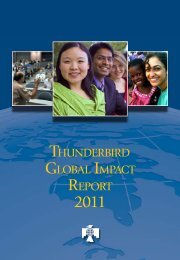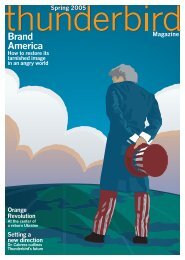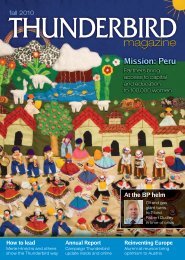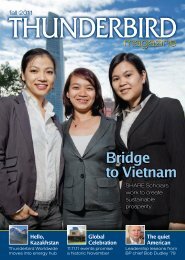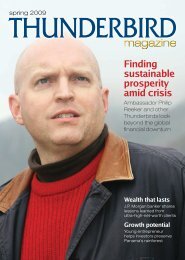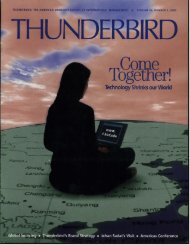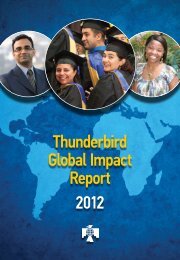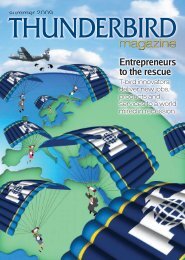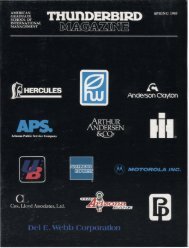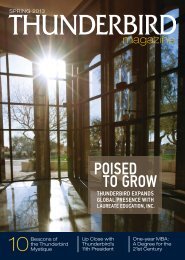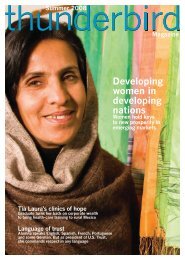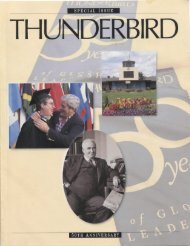ANNUAL REPORT ON GIVING - Thunderbird Magazine ...
ANNUAL REPORT ON GIVING - Thunderbird Magazine ...
ANNUAL REPORT ON GIVING - Thunderbird Magazine ...
Create successful ePaper yourself
Turn your PDF publications into a flip-book with our unique Google optimized e-Paper software.
As <strong>Thunderbird</strong> 2010 became more defined, so<br />
too did <strong>Thunderbird</strong>’s mission statement and<br />
the supporting ideals. By the fall of 2005, the<br />
new mission statement was: “We educate<br />
global leaders who create sustainable prosperity<br />
worldwide.” In support of that mission, the<br />
school also defined five beliefs that defined<br />
<strong>Thunderbird</strong>’s view on what makes a global<br />
leader: Global Mindset, Global Entrepreneurship,<br />
Global Connections, Global Citizenship<br />
and Global Thought Leadership.<br />
“The new mission statement re-defined<br />
<strong>Thunderbird</strong> not around one specific program,”<br />
Cabrera says, “but around one educational<br />
objective, which could and should be attained<br />
through multiple programs to better<br />
serve the demands of a rapidly evolving world.<br />
The new mission statement also reminded all<br />
stakeholders of the ultimate dream behind the<br />
founding of <strong>Thunderbird</strong>: to contribute to a<br />
more peaceful and prosperous world by educating<br />
globally minded leaders capable of creating<br />
value across national and cultural<br />
boundaries.”<br />
<strong>Thunderbird</strong> 2010 structured the school’s<br />
business model around three distinct but mutually<br />
supporting business units: Academic<br />
Programs, which would house all the degree<br />
programs; Corporate Learning, which would<br />
house all non-degree programs and services<br />
offered to corporate clients; and the Research<br />
and Knowledge Network, a think tank dedicated<br />
to advancing our knowledge of global<br />
business and management and making that<br />
knowledge available to practicing managers<br />
and corporations worldwide.<br />
“We had to go from thinking we were a<br />
school that offered one single program, to<br />
thinking of ourselves as an institution that creates<br />
and disseminates knowledge and educates<br />
leaders of global enterprises in a spectrum of<br />
ways,” Cabrera says.<br />
<strong>Thunderbird</strong> 2010 established a number of<br />
priorities for each of the three units that were<br />
summarized in the four “Rs”:<br />
1. Relevance—all programs must be consistent<br />
with the school’s unique mission and beliefs<br />
and clearly differentiated in the market<br />
place;<br />
2. Reach—programs ought to target highgrowth<br />
markets to impact more lives;<br />
3. Resources—each activity and program<br />
must generate sufficient financial returns to<br />
guarantee <strong>Thunderbird</strong>’s long-term viability<br />
and competitiveness;<br />
4. Research—<strong>Thunderbird</strong> must be clearly<br />
positioned as a premier source of knowledge<br />
and ideas for the advancement of global management<br />
practices.<br />
Academic Programs<br />
In summer 2006, a new curriculum for<br />
the MBA in Global Management—the<br />
full-time program—was introduced.<br />
The new curriculum offered a one-year<br />
track for students with meaningful<br />
business undergraduate backgrounds, added<br />
new content in line with the school’s core values,<br />
and reinstated a language requirement for<br />
all students.<br />
“The changes we made to the curriculum<br />
represented a return to our core values,” says<br />
Senior Vice President and Provost Rob Widing.<br />
“It was critical that the school offer a number<br />
of ways to get a <strong>Thunderbird</strong> education,<br />
but we couldn’t lose sight of the fact that our<br />
reputation is built on the quality of the full-<br />
time program, and that the full-time program<br />
should therefore be a flagship of the school’s<br />
beliefs around global management education.”<br />
In fall 2005, the school launched a brand new<br />
Global MBA On-Demand program, which<br />
for the first time used a sophisticated collaborative,<br />
Internet-mediated learning methodology<br />
that broke down geographic barriers in delivering<br />
a <strong>Thunderbird</strong> MBA to working professionals<br />
around the world. The program,<br />
while somewhat controversial among students<br />
and alumni at the time, has been highly<br />
successful and each subsequent cohort has<br />
grown larger and more diverse. The newest,<br />
and fifth, cohort to enter the 18-month program<br />
has 50 students.<br />
“Now that the program has been running<br />
for a couple of years, there is a greater awareness<br />
among prospective students that <strong>Thunderbird</strong><br />
offers a quality Web-based degree,”<br />
says Dr. Bert Valencia, a <strong>Thunderbird</strong> vice<br />
president and head of the program. “Students<br />
who would otherwise be unable to study at<br />
<strong>Thunderbird</strong> are very happy that we offer this<br />
option.”<br />
President Ángel Cabrera<br />
says “We had to go from<br />
thinking we were a<br />
school that offered one<br />
single program, to<br />
thinking of ourselves as<br />
an institution that<br />
creates and disseminates<br />
knowledge and educates<br />
leaders of global<br />
enterprises in a<br />
spectrum of ways.”<br />
thunderbird annual report on giving 11



